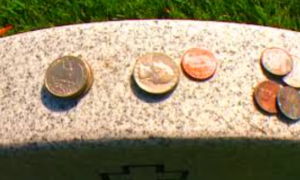Coping with Loss
Losing a loved one is incredibly difficult. Many people express their grief through elaborate tributes, such as floral arrangements, or even by offering food and drinks.
A Meaningful Tradition
One powerful tradition, especially for military families, is placing coins on gravestones. This practice holds deep meaning for those left behind.
The Origins of Placing Coins on Gravestones
The exact history of this tradition remains unclear. Some suggest it dates back to the Roman Empire, though Snopes reports that there’s no solid evidence to support this claim. What is clear is the immense sacrifices made by military members—sacrifices that are hard for many to fully grasp.
Honoring the Fallen
It’s no surprise that those who served together often find ways to honor their fallen comrades. Some speculate that leaving pennies on gravestones became popular during the Vietnam War. During this time, it provided a quiet way for people to communicate with each other, avoiding political debates or difficult conversations with the deceased’s family.

A Practical Gesture
According to the American Legion, leaving a coin became a simple, practical way to show that someone had visited a soldier’s grave. It avoided uncomfortable discussions about the war, especially given the country’s divided views at the time.
Symbolism Behind Each Coin
Each coin left on a grave carries its own meaning.
- A penny simply shows someone visited.
- A nickel means the visitor and the deceased trained together in boot camp.
- A dime symbolizes that they served together, even for a short time.
- A quarter tells the family that the person who left it was with the deceased when they died.
Additional Military Traditions
Challenge coins are another long-standing military tradition. While they don’t have monetary value, they carry immense symbolic significance. This tradition grew during World War I and reflects the unity of those who served together.
Coins in Other Cultures
Coins also play a role in various cultural rituals, often symbolizing good luck, wishes, or even wealth. In some cases, people were buried with their money. For example, Abraham Lincoln reportedly had $2.50 placed over his eyes when he was buried.
A Deeper Connection
While the tradition of leaving coins on gravestones may not directly relate to the monetary symbolism, it represents a much deeper connection. It’s a way for families and comrades to show that the sacrifices of military members have not been forgotten.

Related Posts
Il denaro tradizionale non basta più. Nel silenzio della rete, una nuova razza di casinò sta riscrivendo le regole del gioco, e lo fa con Litecoin. Transazioni…
The rush is real. As Illinois quietly turns smartphones into mini‑casinos, online baccarat is exploding in living rooms, lunch breaks, and late‑night train rides. Lawmakers promise protection…
Online baccarat is slipping into Georgia living rooms, offices, and late‑night kitchens—and many don’t realize how fast it’s growing. Friends whisper over tablets, chasing one more lucky…
The aurora burns above the tundra while another light flickers in the dark: a baccarat table loading on a cracked laptop screen. In Alaska’s silence, the loudest…
Online baccarat in Alabama isn’t just growing—it’s detonating beneath the surface. Regulators thought they were tightening the screws. Instead, they pulled the trigger. As land‑based casinos stalled,…
Rocketplay Casino is a rapidly growing online gambling platform that attracts players with its diverse gaming options and appealing interface. However, when choosing an online casino, one…
